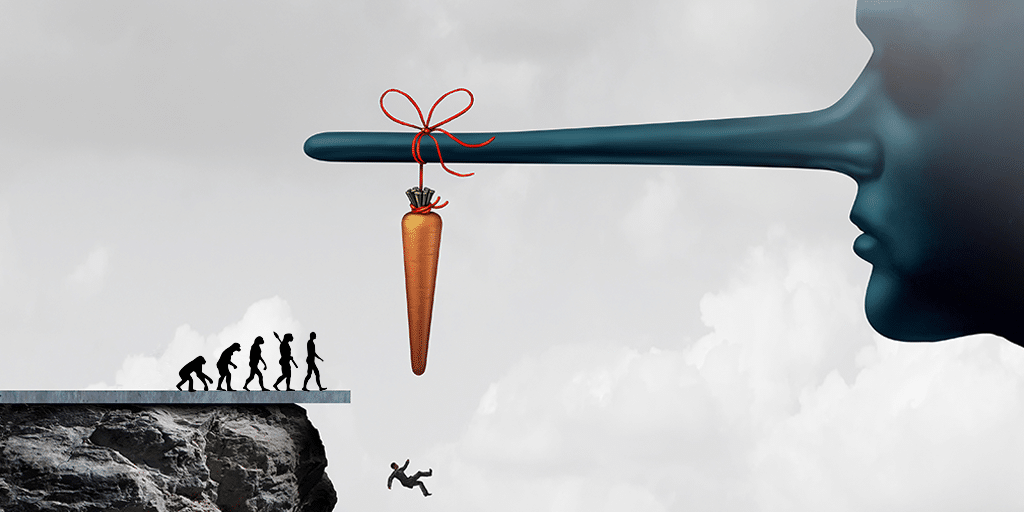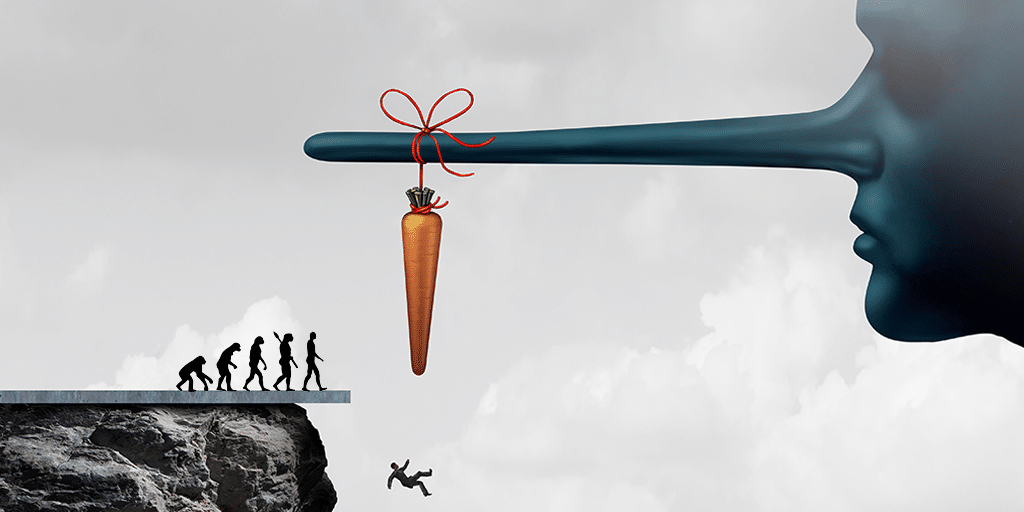The Serious Consequences of Theistic Evolution
| By: Dave Hunt; ©1999 |
| Many Christians are turning to “Theistic Evolution” as a way of harmonizing their religious beliefs with what the scientific community tells them about origins. In this article Dave Hunt explores some of the social and religious consequences of holding this position. |
The Serious Consequences of Theistic Evolution
(excerpted from The Occult Invasion)
Genesis lays the foundation for all of Scripture. If its account of creation isn’t reliable, then neither is the rest of the Bible which rests upon it; and Christ is proven not to be God and Savior, but a mere man who foolishly took a mythological story of Adam and Eve literally (Matthew 19:4,5).
Adam is mentioned about 30 times in nine books of the Bible. Thus to discredit the biblical account of Adam’s creation punctures so many holes in the Bible that it can no longer contain a consistent theology. For example, Luke 3:23-38 traces Christ’s genealogy to Adam, and Christ is even called “the last Adam” (1 Corinthians 15:45). That title would be demeaning in the extreme if Adam were a prehuman creature that had evolved from lower life forms, as Catholicism officially affirms.
The truth is that Christianity is not an isolated development of the New Testament but is inextricably linked with all of the Old Testament and therefore stands or falls upon its accuracy or inaccuracy. Paul declared that the gospel which he preached was “the gospel of God” and that it had been foretold by the Hebrew prophets in the Old Testament (Romans 1:1-3) and was the fulfillment thereof. The Bible is one Book. If any part contradicts any other part, then the whole of Scripture is undermined. If the Bible is wrong in its account of man’s origin, then why should we trust its teaching about man’s redemption?
To support evolution to any degree and in any form is in fact to demolish Christianity. Interestingly enough, the Satanic Bible declares, “Satan represents man as nothing more than another animal, sometimes better, but more often worse than those who walk on four paws, because by the pretext of his ‘divine intellectual and spiritual development,’ he has become the most vicious animal of all.”[1] The American Atheist knows what is at stake: “Destroy Adam and Eve and original sin, and in the rubble you will find the sorry remains of the Son of God and take away the meaning of his death.”[2]
A Theory That Should Be Discarded
In their desire to be in harmony with science, Roman Catholicism and certain evangelicals are backing a dead horse. Growing numbers of scientists are abandoning evolution as completely untenable because the evidence against it is overwhelming. British astronomer and mathematician Sir Fred Hoyle, though he finds the idea of God creating life distasteful, admits, “The scientific world has been bamboozled into believing that evolution has been proved. Nothing could be further from the truth.”[3] Australian biologist Michael Denton, an agnostic and former evolutionist, and author of Evolution: A Theory in Crisis, says science has so thoroughly discredited Darwinian evolution that it should be discarded. Mathematics professor Wolfgang Smith says evolution is a “metaphysical myth…totally bereft of scientific sanction.”[4]
When in 1952 Stanley Miller introduced simulated light into an atmosphere of methane, ammonia, water vapor, and hydrogen and seemingly produced several kinds of amino acids (the building blocks of living creatures), the scientific world was sure it could create life in a laboratory. The pursuit of this chimera, however, has only revealed greater problems. Klaus Dose, a prominent evolutionist, shares his disillusionment:
- More than 30 years of experimentation on the origin of life in the fields of chemical and molecular evolution have led to a better perception of the immensity of the problem of the origin of life on Earth rather than to its solution. At present all discussions on principal theories and experiments in the field either end in stalemate or in a confession of ignorance.[5]
Colin Patterson, Senior Paleontologist at the British Museum of Natural History, confessed: “I had been working on this stuff for more than 20 years, and there was not one thing I knew about it. It’s quite a shock to learn that one can be misled for so long.” Patterson “started asking other scientists to tell him one thing they knew about evolution.” Biologists at the American Museum of Natural History in New York had no answer. Continues Patterson:
- I tried that question on the geology staff at the Field Museum of Natural History and the only answer I got was silence. I tried it on the members of the Evolutionary Morphology Seminar in the University of Chicago, a very prestigious body of evolutionists, and all I got there was silence for a long time and eventually one person said, “I do know one thing—it ought not to be taught in high school.”[6]
Evolution is taught as fact in Catholic schools, where, as the New York Times noted, evolution is “a standard part of the curriculum.”[7] Leonard DeFiore, president of the National Catholic Educational Association in Washington D.C., says, “We start with the premise that all creation came from God. Beyond that it’s a scientific issue.”[8] As cited earlier, Roman Catholic Stephen F. Smith writes, “In Catholic school here in the Archdiocese of Washington, D.C., we were taught that Charles Darwin’s theory of evolution was gospel truth.”[9] Lehigh University biochemist Michael J. Behe writes of his days in Catholic schools: “I don’t remember exactly what was said about life, other than it came from God, and that…the leading scientific explanation for how He did it was Darwin’s theory of evolution.”[10]
Nothing could be more in opposition to Christian belief. Oxford University zoologist Richard Dawkins demonstrates that evolution allows atheists to justify their unbelief. Ironically, however, Dawkins, a leading evolutionist, admits in his book The Blind Watchmaker that “biology is the study of complicated things that give the appearance of having been designed for a purpose.”[11] Isn’t it amazing how everything “chance” produces always looks as though it had been designed!
Notes
- ↑ Anton Szandor La Vey, Satanic Bible (Avon, 1969), from the nine satanic affirmations with which the book begins.
- ↑ The American Atheist, 1978, p. 19, as cited in The Christian News, November 11, 1996.
- ↑ George W. Cornell, “Scientist calls Darwin evolution theory absurd,” in Times-Advocate, December 10, 1982, p. A10.
- ↑ The Christian News, November 11, 1996, p. 15.
- ↑ Klaus Dose, “The Origin of Life: More Questions than Answers,” in Interdisciplinary Science Reviews, 1988, pp. 13,348.
- ↑ Thomas E. Woodward, “Doubts About Darwin,” in Moody, September 1988, p. 20.
- ↑ Times-Picayune, October 25, 1996, p. A-3.
- ↑ Mary Beth Marklein, “Pope: Evolution, religion don’t clash,” in USA Today, October 25, 1996, p. 3A.
- ↑ Stephen F. Smith, “Is Darwinism a Religion?” in The Catholic World Report, December 1996, p. 3A.
- ↑ William Bole, “Of biochemistry and belief,” in Our Sunday Visitor, December 1, 1996, p. 6.
- ↑ Richard Dawkins, The Blind Watchmaker (Longman, England, 1986), p. 1.








